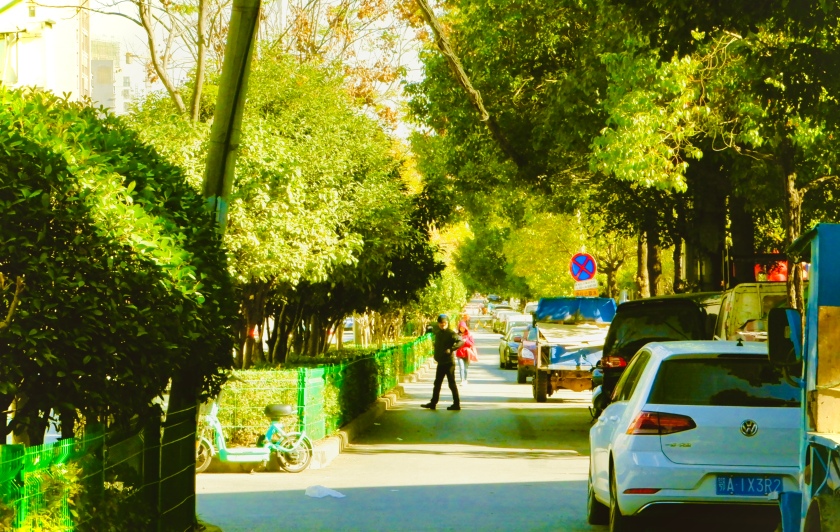By Lou Hsienhua (Tome Loulin)
Jiangcheng1, the book title of River Town by Peter Hessler in its Chinese translation, is a nickname for several southern cities in China along the Yangtze River2 such as Wuhan and Chongqing. But in the book, it’s the nickname for Fuling, another city by the river. For Chinese readers, the name itself could evoke complicated feelings because the cultural connotation of the word Jiangcheng—literally meaning river city in Chinese—suggests something poetic. To mention it would, mostly in the southern regions, means to say something about the central Chinese city of Wuhan where Li Bai, a poet in the Tang dynasty, wrote the poem Listening to upstairs flute sounds from the Yellow Crane Tower with Shilangzhong3:
Going towards Changsha due to demotion, The man, looking out westwards, was unable to see home. There were sounds from the flute playing in the Yellow Crane Tower; Also In the river town, Wuchang, were Chinese plum petals falling in May. By poet Li Bai, the English version is translated from Chinese by Lou Hsienhua in 2021.
So, it might have appeared counterintuitive for readers of the book in its Chinese translation, to discover it’s a collection of reminiscences by an American author recollecting his life as a Peace Crops volunteer in Fuling, in the southwest, in the 1990s, a period that saw rapid economic and cultural transformation happening in the country. At first glance, it’s rather easy to mistake the book as a collection of travel writing authored by someone native of China. But as we look further inside the world portrayed by the author, it’s understandable and sensible for a reader of Chinese to find out in deep awe that the carefully observed details about the river town appear to have been so resonating that the nationality of the author becomes something we gradually forget. Perhaps, besides providing a different perspective on certain things that the locals find to be normal, observations on things closely related to us from the outside offer a rare opportunity for us to see ourselves critically on mature reflection. Overall, one may conclude, from the popularity in China of Peter Hessler’s books even in the translated versions—mostly sold in the category of travel writing—that there is such a thing universally existed as a desire for critical reflections of oneself from the other side. People in one culture crave diverse views of themselves from the outside perhaps for criticalness entails a kind of centrality being given to the overlooked. To be observed, in the first place, suggests a sense of worthiness, a kind of feeling that solaces—albeit temporarily—the lonely minds hungry for serious artistic observation.
Hessler’s language in his writings seems like a treasure seldom in lack of a sense of humor, even in his observations about small places in southwestern China whose artistic presence—in creative nonfiction writing—seemed, at that time, in short supply as evident in his recollections of the noises from the retired teachers playing croquet in Fuling’s teachers college, which he found lovely. Lovely also is his choice of words in part because there was not much serious attention, then, being paid on areas where economic development was relatively lagged behind, compared to large urban areas in the coastal regions of China.
Reading Hessler, anyone from China born before the year 2000 and perhaps many more born after would understand how nostalgic it seems to read and reread his recollections of the days and nights he spent living there in Fuling in part because China back in the 1990s is vastly different from where it is now and largely because of a reminiscence of—almost—an era of people—despite relative material and financial restrictions—living their life in simple ways. Certainly living in the last 90s didn’t seem to be an experience dissimilar to living in the 2020s in terms of humanity though reflections on the era vary person-to-person. But everyone knows that back then, in celebration of entering a new millennium, there were various expectations for a new era. Some were not willing to kiss goodbye the ‘old days’; some willing. But mostly, it was those deeply nostalgic about the past rather than those desiring the unprecedented that came to tell us stories critical to our understanding of who we are and where we come from.

Back in the 90s, living mostly in the rural areas where no one truly owned a colored television until they got married though housing didn’t appear to be such a big issue to many youngsters at that time as is now, I remembered from my mother’s conversations with her friends, that people desired a bigger size of family which means more children and living with grandparents. And, at that time, the influence of postmodern dogmas that merit individualistic ideals, it appeared, didn’t grow so prevalent; and the notion of personal liberity didn’t, yet, evolve into who-cares ideology and radical self-centeredness. People, it seemed then, tend to form more lasting friendships than now in part because social media didn’t emerge at that time; and when it did in this age of information, we bear the brunt of a damaged sense of selfhood. It’s not considered news to discover that people seem to rely completely on virtual and online means to communicate with our friends rather than in-person ways. Thus, no wonder the gradual death of letter writing practice becomes the most significant mark of a divide between the past and now. The 90s, many would argue, is already a distant past so don’t dwell in it.
But how can one not dwell in it when in the end, it is with the fact that our memories, ableit sometimes inaccurate, shaped our narrative that we come to tell our stories.
Perhaps, one should know very early on that Hessler’s River Town is not a book about nostalgia nor is any book by certain similar authors like Fuchsia Dunlop, author of Shark Fin and Sichuan Pepper, in part because time is a theme that we write about all our lives. What the authors writing about small places share is an kind of mindfulness fully aware of the vastness of an landscape tainted by its artistic underrepresentation and an understanding that artistic valuation doesn’t need to be centered on certain corners of the world that have already received, relatively, greater attention such as Paris, London, Hong Kong—and the list could be extended. Certainly no truthful and visceral observations about anything related to the ‘big’ places like Hemingway writing about his experience of living in Paris or like Victor Serge writing about his participation in and reflection on the Soviet revolutions would be considered superfluous; rather, they are essential to our moral and intellectual becoming.
Though, like many other observers from the West, political and ideological elements certainly —if not centrally—captured the attention of the author of River Town, seeing our world in the lens of ideological preferences is, well, almost inevitable. One without the need to cite George Orwell and Victor Serge could easily demonstrate the difficult relationship between politics and art. It’s something every person who wrote and write has to come across. Reflecting on and contemplating the eventful and significant years of the last 60-70s in the US characterized by the civil rights movements and segregation, Toni Morrison made a point about politics influencing art in her preface to her work Sula, stating that if the novel was good, it was because it was faithful to a certain kind of politics; if it was bad, it was because it was faithless to them. One could not help but feel serious literary works of art could hardly be free of ideological influences perhaps in part because ideology is itself a central element that influences how we live. To many, politically influenced writing like those pieces appearing on the op-ed sections with hidden agendas is something whose presence gets larger day by day with the help of social media. What this age in which we live lacks is a calmer voice that tells firsthand experiences about certain matters somewhere distant from a readership that has been told different versions of a story far away from truth. Could we state plainly that what is most in lack in this age of social indifference is truth? Perhaps not with much certainty.
Notes
- Jiangcheng, 江城 in Chinese, is a nickname for several Chinese cities along the river of Changjiang such as Wuhan, Chongqing and other river cities.
- The Long River, also called the Yangtze River by the Westerners, is the longest river in Asia. The river is named differently through its vast catchment area or basin covering almost the entire southern part of China exluding areas in Guangdong, Fujian, and Guangxi provinces in the deep south. In Sichuan or the western basin of the Long River, it’s called the Jinsha River whereas in the central Chinese province of Hubei, the middle basin of the Long River, it’s called the Jing River or Jing Jiang. The lower stretch of the river is called the Yangzi River, or the Yangtze, which is now the name widely adopted by the Westerners to refer to the entire Long River. The preferred name for the entire river is simply Chang Jiang, or the Long River.
- The poem is 《与史郎中钦听黄鹤楼上吹笛》 in Chinese.
